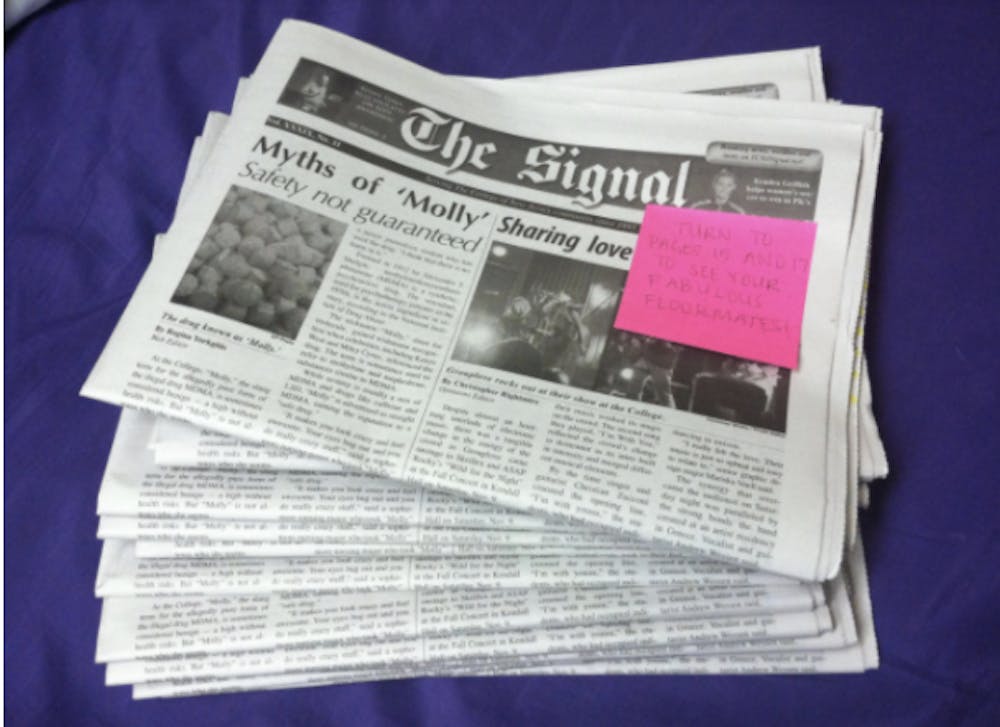By Margaret Varrelmann
Staff Writer
After graduating from the College in 2017 with a Bachelor of Arts in journalism, Sydney Shaw was not sure where post-graduation life would take her.
After experiencing the retail scene, the former editor-in-chief of The Signal was prepared to become a substitute teacher after earning her certification — until she got a phone call one day.
The call — which came one day before she was supposed to begin teaching — was from her former editor of NJ Advance Media, where she held an internship her senior year.

The media company offered her a position as a social media producer. The position involved a lot more than just tweeting, Shaw says.
“I was a content creator, graphic designer, writer, photographer, video editor, customer service rep, marketing strategist, data analyst and web designer — sometimes all in one day,” said Shaw.
Every hour she would copyedit stories before they were published, create social-friendly headlines and take the most intriguing pieces of a story to incorporate into status copies for social media posts.

Now, Shaw is entering the health world as she just accepted a position as communications manager at the New Jersey Department of Health (NJDOH).
She is responsible for preparing press releases and speeches for the commissioner of health, and live-tweeting Governor Murphy’s Covid-19 briefings. She can also be found operating social media campaigns and the NJDOH website. She said finds it incredibly rewarding to help in allowing people access to information they may need to remain healthy and safe.
The pandemic has changed the way the working world operates, and Shaw has seen some of the consequences of the pandemic. From salary cuts and furloughs to a change in coverage type, Shaw has seen it all.
“After a while, you’re not just working from home,” Shaw said. “You’re living at work”.
She said work has become the most emotionally draining thing she has done, as she has to respond to over 200 Instagram messages each day from people navigating everything occurring in the world and who are looking for help.
Aside from covering the pandemic, Shaw has been able to cover a variety of shows, which has brought her joy, even though she does not want the most exciting moments in her life “to only matter because I was near a celebrity whose life is much more interesting and exciting than mine.”
She said being involved with The Signal in college brought so much into her life, and the memories she made stuck with her as she explores the world outside of school.

Her favorite memory at The Signal was speaking to the anonymous creator of the tcnj.snap Snapchat account, whose identity she still has not revealed.
“My saddest memory is driving 20 minutes to the nearest (at the time) Wawa for coffee at 4 a.m. one production night, only to find it closed,” said Shaw. “I cried in the parking lot out of pure exhaustion. It wasn’t so funny at the time, but looking back, it’s just so Signal.”
Her most meaningful moments come from all of her time spent with her Signal colleagues.
“It feels sacred in a way to look back on the little mundane moments we shared before we became friends.”
With her experience in the working world, Shaw has some advice to give to both writers and students.
“Trust your editors, and know that for the rest of your life, you will always have a lot to learn about journalism,” she said. “There’s always going to be someone who is better than you, and you can either resent them for it or let them make you better.”
To journalism majors at the College today, Shaw recognizes the extra obstacles created by the pandemic, but encourages students to have hope for the future.
“I want to stress how hard it is to find a job in this field — and how that is not a reflection of your merit or your intelligence,” said Shaw. “You could be the most qualified person in the world for a job, but oftentimes, you’re still going to need a bit of luck. You’ll get there.”







